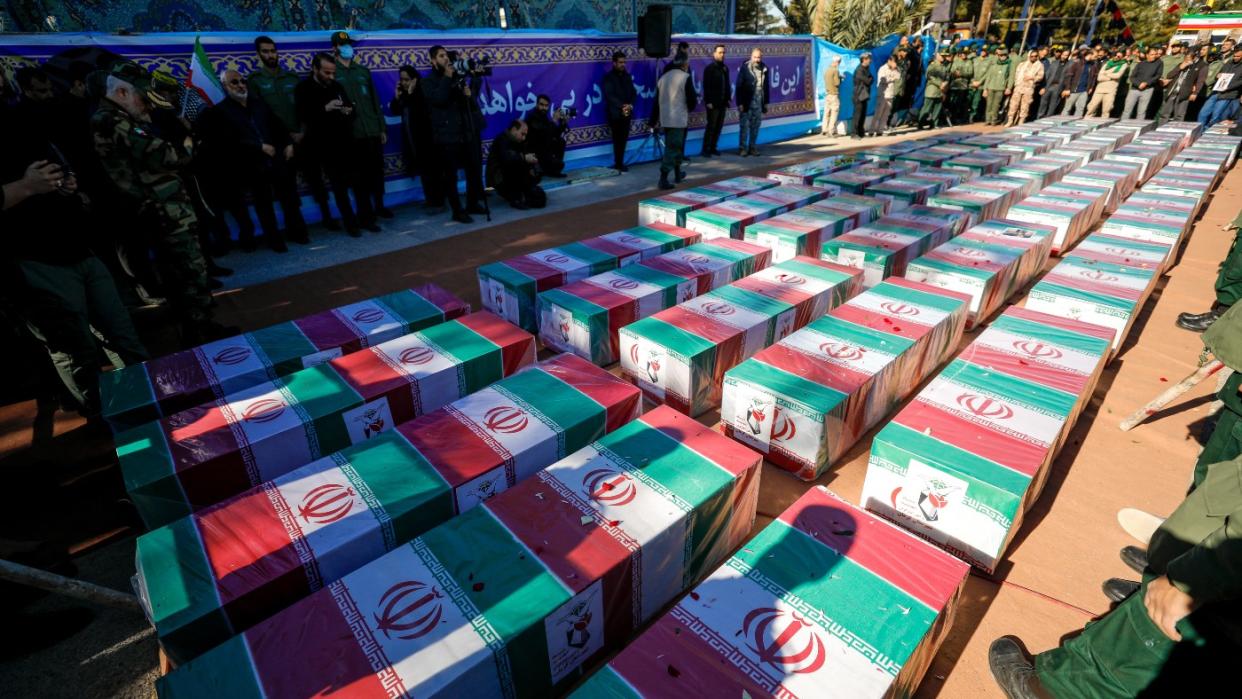How Islamic State bombings in Iran could escalate regional war

- Oops!Something went wrong.Please try again later.
Islamic State has claimed responsibility for the worst terrorist attack in the history of Iran, which risks pushing the already unstable Middle East one step closer to regional conflict.
At least 84 people were killed when two blasts "ripped through the crowds" in the city of Kerman in southern Iran, said The Guardian, near the tomb of Qasem Soleimani on the fourth anniversary of his assassination by the US. The senior Revolutionary Guards commander had been "a staunch enemy" of Islamic State (IS), which "resents the damage he did to its cause in Iraq and Syria".
Iran initially blamed both the US and Israel, leading to fears of an all-out confrontation. The bombing came less than 24 hours after Israel assassinated the deputy head of Hamas, Saleh al-Arouri, in Lebanon, provoking an angry response from Iranian proxy Hezbollah.
With the West already threatening military action against Iran-backed Houthi rebels attacking shipping in the Red Sea, both Tuesday's strike on Lebanese soil and Wednesday's bombings in Iran risk increasing tension between Iran, Israel and the US.
What happened?
The site of the attack was "highly symbolic", said the Financial Times (FT). Known as Iran's "shadow commander", Soleimani was the country's most powerful military figure and is "revered as a national hero by the Islamic regime and its supporters".
He was killed in a US drone strike on Baghdad in 2020 ordered by the then president Donald Trump, who described him as "the number one terrorist anywhere in the world".
Early confusion over the cause of Wednesday's bombing – after the mayor of Kerman said it was an accidental gas explosion – quickly gave way to speculation and blame. Iran's President Ebrahim Raisi flatly accused the "criminal America and Zionist regime", warning they would pay "a very high price", while Soleimani's successor, Ismail Qaani, also blamed both Israel and the US for the "terror attack".
Iranian officials pointed out that the bombings took place the day after Iranian opposition figure Vahid Beheshti had appeared at Israel's parliament urging the direct targeting of Iran. As recently as last week, a senior Iranian commander was killed during Israeli air strikes in Syria.
Who was behind the attack?
Iran has "multiple foes", noted The Associated Press, "including exile groups, militant organisations and state actors". But based on the target and the methods used, Islamic State was assumed by many to have been the culprit. A senior Biden official said the explosions bore the hallmarks of IS, which is composed of loose affiliates around the Muslim world.
On Thursday, the terrorist group posted a statement on its affiliate Telegram channels claiming that two of its members had detonated explosive belts. The statement, titled "And Kill Them Wherever You Find Them", named the two bombers (who were brothers) and said they targeted a gathering of "polytheists".
But the group offered "no further proof", said CNN, and their account of the blasts "differs from that given by Iranian media". The death toll provided by IS was "significantly higher" than that reported by Iranian officials.
Is Islamic State back?
Put simply, it never went away.
For years, Sunni extremist groups including IS have conducted large-scale attacks against civilians in the Shiite-majority Iran. IS considers the Shia branch of Islam to be heretical, and has previously targeted shrines and religious sites in Iran, which is led by a theocratic government ruled by Shiite clerics.
The bombing in Iran was "the latest bloody episode" in IS’s targeting of Iran, which it considers "an irredeemable sectarian foe", said The New York Times. The Iranian authorities have claimed to have thwarted at least a dozen more IS attacks, said the paper.
IS Khorasan Province, its much-feared branch in Afghanistan, has "repeatedly threatened Iran" over its polytheism, and has claimed responsibility for several attacks on the country, the most recent being in 2022 when a gunman killed 13 people at a shrine in Shiraz.
Although there is "no love lost" between IS and Iran, a former Pentagon official in the Trump administration told the paper, "it does seem like an odd time to launch an attack with the current conflict in Gaza and the unified Muslim support for the Palestinians".
What happens next?
Iran's Supreme Leader Ayatollah Ali Khamenei has vowed a "harsh response" to the attacks. The president has cancelled a scheduled trip to Turkey, and the country will want to limit the amount of traffic crossing the border with Afghanistan, said Patrick Wintour in The Guardian.
There is "no sign" that Iran will take swift retribution for the attack, said Wintour. However, it will attempt to "harness a wave of sympathy in the Islamic world to press its call for an end to what it regards as the US's destabilising interventions in the Middle East".

